My day job is in publishing, and thanks to browngrotta arts’ catalog publishing program, my night job is too. We’ve got books and papers everywhere. My rules for 2010: No pile of papers, books or magazines may grow taller than two feet and there may not be more than six piles (that are mine) in the house at one time. That’s 12 feet of reading for next year. You’d think that would be enough, but maybe not. So, I asked artists whose work browngrotta arts represents for book recommendations. Specifically: “Is there a book that has had a particular influence on your work or decision to pursue art as a career?” Here’s the first installment of their thoughtful replies: 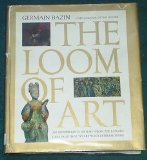 Gyöngy Laky: It is difficult for me to think of a particular book that launched me into what I am doing today…there have been many and it was long ago that I set out on this path in art! But, there is one general art history book that I bought as a young person when I spent a year studying art and French in Paris in 1963-64! And, funny enough… it was titled The Loom of Art
Gyöngy Laky: It is difficult for me to think of a particular book that launched me into what I am doing today…there have been many and it was long ago that I set out on this path in art! But, there is one general art history book that I bought as a young person when I spent a year studying art and French in Paris in 1963-64! And, funny enough… it was titled The Loom of Art by Germain Bazin, curator of the Louvre (Simon Schuster, NY, 1962) probably way out of print! The book is beautiful and I have it and love it still.
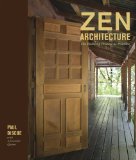 More recently my friend, who is a builder, designer, wood collector extraordinaire, Paul Discoe, put out a book on his work, Zen Architecture: The Building Process as Practice
More recently my friend, who is a builder, designer, wood collector extraordinaire, Paul Discoe, put out a book on his work, Zen Architecture: The Building Process as Practice (with Alexandra Quinn, Gibbs Smith, 2008). It is a wonderful book. He collects street trees and mills them and uses them in his work so he is dear to my heart.
 Another book, for children, but adults love it too is If… (Getty Trust Publications : J. Paul Getty Museum)
Another book, for children, but adults love it too is If… (Getty Trust Publications : J. Paul Getty Museum) IF (Getty Publications; J. Paul Getty Museum; First Edition edition 1995) by another artist friend of mine, Sarah Perry.
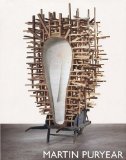 And, of course, I love and am inspired by Martin Puryear
And, of course, I love and am inspired by Martin Puryear (The Museum of Modern Art, New York 2007) by John Elderfield, Elizabeth Reede, Richard Powell, Michael Auping, Martin Puryear.
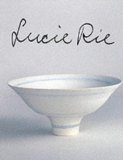 Scott Rothstein: Here is one I love: Lucie Rie
Scott Rothstein: Here is one I love: Lucie Rie by Tony Birks (Marston House 1994). I feel this book documents her work very well. I am always amazed at the “drawing” she could do with glaze.
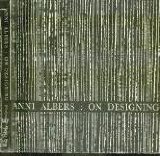 Kay Sekimachi: Yes, there is a book. Anni Albers: On Designing
Kay Sekimachi: Yes, there is a book. Anni Albers: On Designing (Wesleyan 1971). It was my weaving “Bible”. In fact everything she wrote makes so much sense to me.
 Nancy Koenigsberg: I have worked as an artist – painter, rug designer, knitter – for many years, but when I read Beyond Craft: The Art Fabric: Mainstream
Nancy Koenigsberg: I have worked as an artist – painter, rug designer, knitter – for many years, but when I read Beyond Craft: The Art Fabric: Mainstream by Mildred Constantine/Jack Larsen (Van Nostrand Reinhold 1972) it just turned my ideas and work upside down. I saw what was possible with the materials I was using and what else was out there. That book opened up a whole new world to me.
 Mary Merkel-Hess: Your question has set me thinking about exactly why I did choose art as a career. I think, actually, the desire originated in the ethnographic collection of the Milwaukee Public Museum where I whiled away hours between classes looking at objects from South America, Africa and Europe. But, back to your question. A book that is much on my mind just recently is The Unknown Craftsman: A Japanese Insight into Beauty
Mary Merkel-Hess: Your question has set me thinking about exactly why I did choose art as a career. I think, actually, the desire originated in the ethnographic collection of the Milwaukee Public Museum where I whiled away hours between classes looking at objects from South America, Africa and Europe. But, back to your question. A book that is much on my mind just recently is The Unknown Craftsman: A Japanese Insight into Beauty by Soetsu Yanagi (Kodansha International, Revised edition, 1990). One of my first trips after arriving in Tokyo three weeks ago was to the Mingeikan, Yanagi’s museum and home. It was a delight, after so many years, to see some of the work pictured in the book. Yanagi’s theory that hard, repetitive practice resulted eventually in the disengagement of self and led to work of merit produced with ease was an inspiration to me. I was a young grad student when I first read the book and at the time every day was a struggle.
 Kate Hunt: The Savage Mind (Nature of Human Society)
Kate Hunt: The Savage Mind (Nature of Human Society) by Claude Levi-Strauss (University Of Chicago Press, 1968). The introduction made me think about the role of an artist and about materials.
